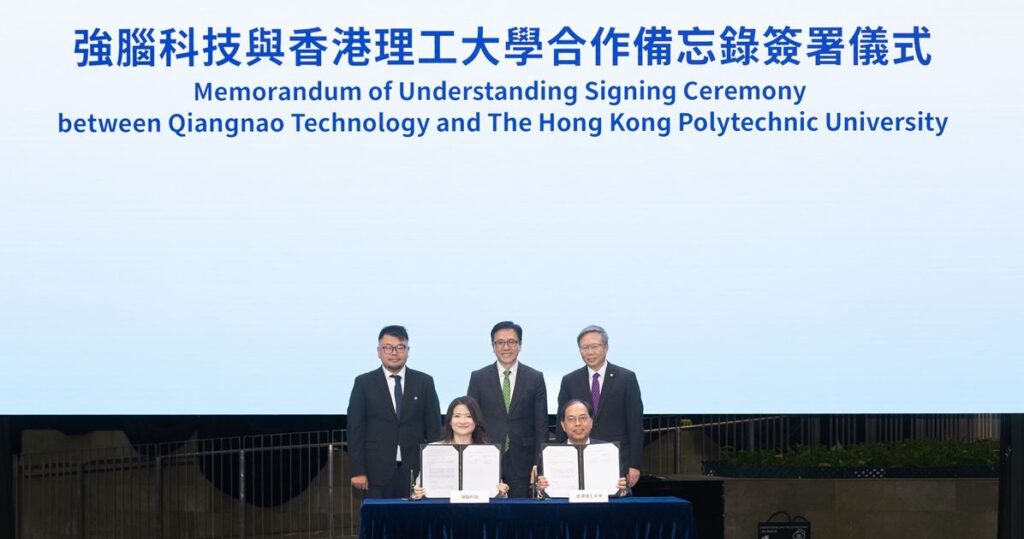
The Hong Kong Polytechnic University (PolyU) and Zhejiang Qiangnao Technology Co. Limited have entered into a significant partnership by signing a Memorandum of Understanding (MoU) to establish the “PolyU-Qiangnao Joint Research Centre for Brain-Computer Interface” at Cyberport. This collaboration aims to enhance the deployment of Qiangnao Technology’s intelligent bionic limbs in Hong Kong, further advancing the integration of medical technology for individuals with disabilities.
The MoU was signed in the presence of key figures including Prof. Jin-Guang Teng, President of PolyU, Prof. SUN Dong, Secretary for Innovation, Technology and Industry, and Mr. Bicheng Han, Founder and Chief Executive Officer of Qiangnao Technology. Prof. Zheng Yongping, the Henry G. Leong Professor in Biomedical Engineering and Director of the Research Institute for Smart Ageing at PolyU, and Ms. Nyx HE, Partner at Qiangnao Technology, represented their respective organizations during the signing.
Prof. Teng emphasized the partnership’s potential to bolster Hong Kong’s innovation ecosystem in smart rehabilitation technology. He noted that PolyU has been at the forefront of nurturing healthcare professionals for over 50 years, training more than 50,000 individuals. The university is committed to integrating medicine and engineering, with an emphasis on artificial intelligence in medical advancements. Currently, PolyU is working towards establishing Hong Kong’s third medical school to leverage its strengths in research and talent development.
The collaboration aligns with recent governmental initiatives aimed at improving healthcare for amputees. The Innovation and Technology Fund announced a two-year scheme that provides full subsidies for amputees in Hong Kong to access high-tech prostheses at no cost. Prof. Teng expressed commitment to participate in this initiative, ensuring that the installation and evaluation of intelligent bionic limbs are performed according to professional standards, ultimately enabling amputees to benefit from innovative rehabilitation technologies.
Mr. Han articulated Qiangnao Technology’s dedication to developing non-invasive brain-computer interface (BCI) and intelligent prosthetic technologies. The company has pioneered the world’s first mass-produced intuitive-controlled intelligent prosthetic bionic hands and innovative applications in rehabilitation, sports health, and education. He expressed enthusiasm for partnering with PolyU to expedite the validation and clinical application of their technologies.
Founded in 2015, Qiangnao Technology has made strides in the non-invasive BCI field, becoming the first Chinese team selected by the Harvard Innovation Lab and achieving unicorn status in BCI in China. The company holds a portfolio of over 420 patents and has successfully launched its products in multiple markets worldwide, focusing on rehabilitation and assistive technologies for individuals with disabilities.
The partnership between PolyU and Qiangnao Technology will focus on collaborative research, development, and clinical studies related to BCI products. They aim to create a next-generation BCI technology platform that fosters education and training initiatives. This will include curriculum design and student competitions, executed jointly by PolyU’s Department of Biomedical Engineering and Qiangnao Technology.
Prof. Zheng will lead the collaborative efforts, drawing on his expertise in ultrasound imaging, intelligent rehabilitation, and smart ageing technologies. His team has made significant advancements in BCI signaling technologies and has been recognized internationally, including winning the Gold Medal with Congratulations of the Jury at the 49th International Exhibition of Inventions in Geneva for developing ProRuka, a prosthetic hand controlled by sonomyography and AI algorithms.
With a proven track record in medical device invention and commercialization, Prof. Zheng aims to establish a comprehensive BCI platform that encompasses research, application, evaluation, and technology transfer in collaboration with Qiangnao Technology. This initiative will also include clinical evaluations, intelligent bionic limb installations, training, and follow-up assessments, creating a standardized deployment system that benefits users in Hong Kong, the Greater Bay Area, and beyond.






